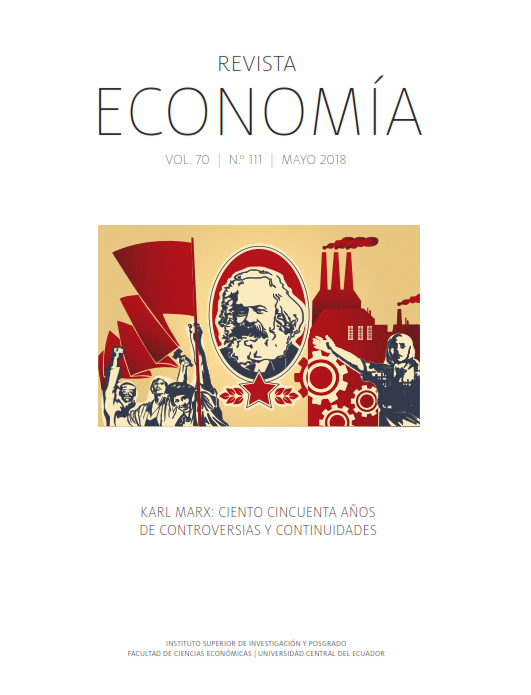La renta del cuerpo como fuente de riqueza de las celebridades. Estudio de caso: la estrella de la industria musical
Main Article Content
Abstract
In today’s society, within the distributive conflict between capital and work, a new class stratum has emerged, the rentiers of the body, popularly known as ‘celebrities’. Ideologically, these rentiers promote the hegemony that earns the admiration of the masses. However, from an economic perspective, their place is different. They are parasites that extend their wealth by shifting a part of the surplus value generated by the collective worker with the sale of merchandise linked to the cultural industry. Here we will explain the origin of their social power: the body rent. To do so, we will develop the concept taking as basis the theory of ground rent exposed by Marx as well as a case study of music celebrities.
Downloads
Article Details
The authors who publish in this journal accept the following conditions:
- The authors retain the copyright and assign to the Economics Magazine the right of the first publication, with the work registered under Creative Commons Attribution-NonCommercial 4.0, which enables third parties to redistribute, commercial or non-commercial, of what has been published as long as the article circulates completely and without changes.
- Authors can make other independent and additional contractual agreements for the distribution of the article published in this journal (for example, add it to an institutional repository or publish it in a book) as long as they clearly and clearly specify that the article was published for the first time. once in Revista Economía. In case of reproduction, a note similar to the one presented below must be included: This text was originally published in the Revista Economía No.…, volume…, number of pages, year of publication.
- Authors are suggested to publish their work on the internet (for example, on institutional or personal pages) of the final version published by Revista Economía since this can lead to greater and faster dissemination of the published article.
References
Astarita, R. (2009). Monopolio, imperialismo e intercambio desigual. Madrid, España: Maia.
Astarita, R. (2014, abril 14). Teorías del valor: austríacos vs. marxistas (iv parte). Rolando Astarita Blog. Recuperado de https://rolandoastarita.blog/2014/04/17/teorias-del-valor-austriacos-vs-marxistas-4/
Bourdieu, P. (2001 [2000]). Poder, derecho y clases sociales. Bilbao, España: Desclée.
Brant, E. (2013, septiembre 26). Rihanna wins permanent ban on Topshop selling T-shirt. bbc. Recuperado de http://www.bbc.co.uk/newsbeat/article/24282079 rihanna-wins-permanent-ban-on-topshop-selling-t-shirt
Byrne, D. (2012). How music works. Edinburg, usa: Canongate Books.
Eagleton, T. (2011). Por qué Marx tenía razón. Barcelona, España: Península.
Garbulsky, J. (2016, septiembre 16). Puig lanza al mercado la nueva fragancia de Shakira. Masarik tv. Recuperado de https://masaryk.tv/205624/puig-lanza-al-mercado-la-nueva-fragancia-de-shakira
García Aristegui, D. (2014). ¿Por qué Marx no habló de copyright?: la propiedad intelectual y sus revoluciones. Madrid, España: Enclave de Libros.
Gramsci, A. (2000 [1975]). Cuadernos de la cárcel. México df, México: Era.
Guerrero, D. (1990). Cuestiones polémicas en torno a la teoría marxista del trabajo productivo. Política y Sociedad, 5, 119-130.
Guerrero, D. (2009a). Economía y filosofía en El capital de Marx: la teoría laboral del valor. Filosofía, economía y política en el Laberinto, 29, 51-69.
Guerrero, D. (2009b [2008]). Un resumen completo de El capital de Marx. Madrid, España: Maia.
Harman, C. (2013 [1999]). Historia mundial del pueblo. Desde la Edad de Piedra hasta el nuevo milenio. Madrid, España: Akal.
Horkheimer, M. y Adorno, T. (2009 [1969, 1944]). Dialéctica de la Ilustración. Madrid, España: Trotta.
Husson, M. (2007). Leer El capital hoy. En G. Deville, El capital (Resumido por Gabriel Deville). Barcelona, España: Los Libros de la Frontera.
Jefferson, C. (2010, junio 7). The music industry’s funny money. The Root. Recuperado de https://www.theroot.com/the-music-industrys-funny-money-1790880088
Illescas, J. E. (2014). Industrias culturales y juventud en el sistema-mundo. El videoclip mainstream como mercancía y como reproductor de ideología. (Tesis doctoral). Universidad de Alicante.Alicante, España.
Illescas, J. E. (2016 [2015]). La dictadura del videoclip. Industria musical y sueños prefabricados. Barcelona,España: El Viejo Topo.
International Federation of the Phonographic Industry (ifpi) (2012). Investign in music. How music companies discover, nurture and promote talent. London, uk: ifpi.
Kelley, N. (2002). Rhythm and business. The political economy of black music. New York, usa: Akashic Books.
Lamelas, M. (24 de abril 2017). Puig coge carrerilla y su beneficio se dispara un 23% en 2016. El Confidencial. Recuperado de https://www.elconfidencial.com/empresas/2017-04-24/puig-resultados-beneficio-karlie-kloss_1371697/
Manzanera Salavert, M. (2015). Atravesando el desierto. Balance y perspectivas del marxismo en el siglo xxi. Barcelona, España: El Viejo Topo.
Marx, K. (2009). El capital. Libro i Capítulo vi. Resultados del proceso inmediato de producción. México df, México: Siglo xxi.
Marx, K. (2010 [1872]). El capital (3 tomos, 8 volúmenes). Madrid, España: Siglo xxi.
National Aeronautics and Space Administration (nasa) (2014). Astronaut Candidate Program. nasa. Recuperado de https://astronauts.nasa.gov/content/broch00.htm
Passman, D. S. (2012). All You Need to Know About the Music Business. New York, usa: Simon & Schuster.
Robertson, J. (31 de julio de 2013). Rihanna wins High Court Battle Court against Topshop in ‘$ 5million lawsuit’ for using her image without permission. Mirror. Recuperado de https://www.mirror.
co.uk/3am/celebrity-news/rihanna-wins-lawsuit-court-battle-2107594
Samuel, S. (2011). Sin compositor no hay canción. Organización Mundial de la Propiedad Intelectual, 5, 22-24.
Schwartz, L. M. (2007). Making music videos: everything you need to know from the best in the business. New York, usa: Billboard Books.
Sherwin, A. (19 de agosto de 2014). Justin Bieber and Taylor Swift put stink on Arden’s celebrity perfumes.
The Independent. Recuperado de http://www.independent.co.uk/news/business/news/justin-bieber-and-taylor-swift-put-stink-on-ardens-celebrity-perfumes-9679107.html
Smith, S. (2015, abril 2). 10 most expensive celebrity parts ever insured: The curious logic behind singers insuring their legs for millions. Ashburnham Insurance Services. Recuperado de https://www.ashburnham-insurance.co.uk/blog/2015/04/10-most-expensive-celebrity-body-parts-ever-insured/
unesco (2010). Políticas para la creatividad. Guía para el desarrollo de las industrias culturales y creativas. París, Francia: unesco.

